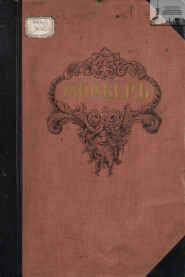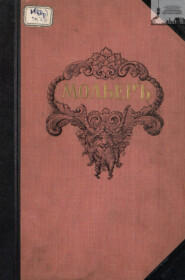По всем вопросам обращайтесь на: info@litportal.ru
(©) 2003-2025.
✖
The School for Husbands
Год написания книги
2017
Настройки чтения
Размер шрифта
Высота строк
Поля
ISA. Desperately! Her passion is so great that I can compare it with nothing; you may judge of its violence by her coming here alone, at this hour, to confide to me her love, and to tell me positively that she will die if she does not obtain the object of her desire; that, for more than a year, a secret intercourse has kept up the ardour of their love; and that they had even pledged themselves to marry each other when their passion was new.
SGAN. Oh, the wretched girl!
ISA. That, being informed of the despair into which I had plunged the man whom she loves to see, she came to beg me to allow her to prevent a departure which would break her heart; to meet this lover to-night under my name, in the little street on which my room looks, where counterfeiting my voice, she may utter certain tender feelings, and thereby tempt him to stay; in short, cleverly to secure for herself the regard which it is known he has for me.
SGAN. And do you think this…
ISA. I? I am enraged at it. "What," said I, "sister, are you mad? Do you not blush to indulge in such a love for one of those people who change every day? To forget your sex, and betray the trust put in you by the man whom Heaven has destined you to marry?"
SGAN. He deserves it richly; I am delighted by it.
ISA. Finally my vexation employed a hundred arguments to reprove such baseness in her, and enable me to refuse her request for to-night; but she became so importunate, shed so many tears, heaved so many sighs, said so often that I was driving her to despair if I refused to gratify her passion, that my heart was brought to consent in spite of me; and, to justify this night's intrigue, to which affection for my own sister made me assent, I was about to bring Lucretia to sleep with me, whose virtues you extol to me daily; but you surprised me by your speedy return.
SGAN. No, no, I will not have all this mystery at my house. As for my brother, I might agree to it; but they may be seen by some one in the street, and she whom I am to honour with my body must not only be modest and well-born; she must not even be suspected. Let us send the miserable girl away, and let her passion…
ISA. Ah, you would overwhelm her with confusion, and she might justly complain of my want of discretion. Since I must not countenance her design, at least wait till I send her away.
SGAN. Well, do so.
ISA. But above all, conceal yourself, I beg of you, and be content to see her depart without speaking one word to her.
SGAN. Yes, for your sake I will restrain my anger; but as soon as she is gone, I will go and find my brother without delay. I shall be delighted to run and tell him of this business.
ISA. I entreat you, then, not to mention my name. Good night; for I shall shut myself in at the same time.
SGAN. Till to-morrow, dear… How impatient I am to see my brother, and tell him of his plight! The good man has been victimized, with all his bombast!
[Footnote: The original has phébus, which is often used for a swollen and pretentious style, because it is said that a work on the chase, written in the fourteenth century by Gaston, Count of Foix, in such a style, was called Miroir de Phébus. It is more probable that the word phébus, meaning showy language, is derived from the Greek phoibos, brilliant.]
I would not have this undone for twenty crowns!
ISA. (Within). Yes, sister, I am sorry to incur your displeasure; but what you wish me to do is impossible. My honour, which is dear to me, would run too great a risk. Farewell, go home before it is too late.
SGAN. There she goes, fretting finely, I warrant. Let me lock the door, for fear she should return.
ISA. (Going out disguised). Heaven! abandon me not in my resolve!
SGAN. Whither can she be going? Let me follow her.
ISA. (Aside). Night, at least, favours me in my distress.
SGAN. (Aside). To the gallant's house! What is her design?
SCENE III. – VALÈRE, ISABELLA, SGANARELLE
VAL. (Coming out quickly). Yes, yes; I will this night make some effort to speak to… Who is there?
ISA. (To Valère). No noise, Valère; I have forestalled you; I am Isabella.
SGAN. (Aside). You lie, minx; it is not she. She is too staunch to those laws of honour which you forsake; you are falsely assuming her name and voice.
ISA. (To Valère). But unless by the holy bonds of matrimony…
VAL. Yes; that is my only purpose; and here I make you a solemn promise that to-morrow I will go wherever you please to be married to you.
SGAN. (Aside). Poor deluded fool!
VAL. Enter with confidence. I now defy the power of your duped Argus; before he can tear you from my love, this arm shall stab him to the heart a thousand times.
SCENE IV. – SGANARELLE, alone
Oh, I can assure you I do not want to take from you a shameless girl, so blinded by her passion. I am not jealous of your promise to her; if I am to be believed, you shall be her husband. Yes, let us surprise him with this bold creature. The memory of her father, who was justly respected, and the great interest I take in her sister, demand that an attempt, at least, should be made to restore her honour. Hulloa, there! (Knocks at the door of a magistrate).
[Footnote: See page 261, note 5.]
SCENE V. – SGANARELLE, A MAGISTRATE, A NOTARY, ATTENDANT with a lantern
MAG. What is it?
SGAN. Your servant, your worship. Your presence in official garb is necessary here. Follow me, please, with your lantern-bearer.
MAG. We were going…
SGAN. This is a very pressing business.
MAG. What is it?
SGAN. To go into that house and surprise two persons who must be joined in lawful matrimony. It is a girl with whom I am connected, and whom, under promise of marriage, a certain Valère has seduced and got into his house. She comes of a noble and virtuous family, but…
MAG. If that is the business, it was well you met us, since we have a notary here.
SGAN. Sir?
NOT. Yes, a notary royal.
MAG. And what is more, an honourable man.
SGAN. No need to add that. Come to this doorway; make no noise, but see that no one escapes. You shall be fully satisfied for your trouble, but be sure and do not let yourself be bribed.
MAG. What! do you think that an officer of justice…
SGAN. What I said was not meant as a reflection on your position. I will bring my brother here at once; only let the lantern-bearer accompany me. (Aside). I am going to give this placable man a treat. Hulloa! (Knocks at Ariste's door).
* * * * *
SCENE VI. – ARISTE, SGANARELLE
AR. Who knocks? Why, what do you want, brother?
SGAN. Oh, the wretched girl!
ISA. That, being informed of the despair into which I had plunged the man whom she loves to see, she came to beg me to allow her to prevent a departure which would break her heart; to meet this lover to-night under my name, in the little street on which my room looks, where counterfeiting my voice, she may utter certain tender feelings, and thereby tempt him to stay; in short, cleverly to secure for herself the regard which it is known he has for me.
SGAN. And do you think this…
ISA. I? I am enraged at it. "What," said I, "sister, are you mad? Do you not blush to indulge in such a love for one of those people who change every day? To forget your sex, and betray the trust put in you by the man whom Heaven has destined you to marry?"
SGAN. He deserves it richly; I am delighted by it.
ISA. Finally my vexation employed a hundred arguments to reprove such baseness in her, and enable me to refuse her request for to-night; but she became so importunate, shed so many tears, heaved so many sighs, said so often that I was driving her to despair if I refused to gratify her passion, that my heart was brought to consent in spite of me; and, to justify this night's intrigue, to which affection for my own sister made me assent, I was about to bring Lucretia to sleep with me, whose virtues you extol to me daily; but you surprised me by your speedy return.
SGAN. No, no, I will not have all this mystery at my house. As for my brother, I might agree to it; but they may be seen by some one in the street, and she whom I am to honour with my body must not only be modest and well-born; she must not even be suspected. Let us send the miserable girl away, and let her passion…
ISA. Ah, you would overwhelm her with confusion, and she might justly complain of my want of discretion. Since I must not countenance her design, at least wait till I send her away.
SGAN. Well, do so.
ISA. But above all, conceal yourself, I beg of you, and be content to see her depart without speaking one word to her.
SGAN. Yes, for your sake I will restrain my anger; but as soon as she is gone, I will go and find my brother without delay. I shall be delighted to run and tell him of this business.
ISA. I entreat you, then, not to mention my name. Good night; for I shall shut myself in at the same time.
SGAN. Till to-morrow, dear… How impatient I am to see my brother, and tell him of his plight! The good man has been victimized, with all his bombast!
[Footnote: The original has phébus, which is often used for a swollen and pretentious style, because it is said that a work on the chase, written in the fourteenth century by Gaston, Count of Foix, in such a style, was called Miroir de Phébus. It is more probable that the word phébus, meaning showy language, is derived from the Greek phoibos, brilliant.]
I would not have this undone for twenty crowns!
ISA. (Within). Yes, sister, I am sorry to incur your displeasure; but what you wish me to do is impossible. My honour, which is dear to me, would run too great a risk. Farewell, go home before it is too late.
SGAN. There she goes, fretting finely, I warrant. Let me lock the door, for fear she should return.
ISA. (Going out disguised). Heaven! abandon me not in my resolve!
SGAN. Whither can she be going? Let me follow her.
ISA. (Aside). Night, at least, favours me in my distress.
SGAN. (Aside). To the gallant's house! What is her design?
SCENE III. – VALÈRE, ISABELLA, SGANARELLE
VAL. (Coming out quickly). Yes, yes; I will this night make some effort to speak to… Who is there?
ISA. (To Valère). No noise, Valère; I have forestalled you; I am Isabella.
SGAN. (Aside). You lie, minx; it is not she. She is too staunch to those laws of honour which you forsake; you are falsely assuming her name and voice.
ISA. (To Valère). But unless by the holy bonds of matrimony…
VAL. Yes; that is my only purpose; and here I make you a solemn promise that to-morrow I will go wherever you please to be married to you.
SGAN. (Aside). Poor deluded fool!
VAL. Enter with confidence. I now defy the power of your duped Argus; before he can tear you from my love, this arm shall stab him to the heart a thousand times.
SCENE IV. – SGANARELLE, alone
Oh, I can assure you I do not want to take from you a shameless girl, so blinded by her passion. I am not jealous of your promise to her; if I am to be believed, you shall be her husband. Yes, let us surprise him with this bold creature. The memory of her father, who was justly respected, and the great interest I take in her sister, demand that an attempt, at least, should be made to restore her honour. Hulloa, there! (Knocks at the door of a magistrate).
[Footnote: See page 261, note 5.]
SCENE V. – SGANARELLE, A MAGISTRATE, A NOTARY, ATTENDANT with a lantern
MAG. What is it?
SGAN. Your servant, your worship. Your presence in official garb is necessary here. Follow me, please, with your lantern-bearer.
MAG. We were going…
SGAN. This is a very pressing business.
MAG. What is it?
SGAN. To go into that house and surprise two persons who must be joined in lawful matrimony. It is a girl with whom I am connected, and whom, under promise of marriage, a certain Valère has seduced and got into his house. She comes of a noble and virtuous family, but…
MAG. If that is the business, it was well you met us, since we have a notary here.
SGAN. Sir?
NOT. Yes, a notary royal.
MAG. And what is more, an honourable man.
SGAN. No need to add that. Come to this doorway; make no noise, but see that no one escapes. You shall be fully satisfied for your trouble, but be sure and do not let yourself be bribed.
MAG. What! do you think that an officer of justice…
SGAN. What I said was not meant as a reflection on your position. I will bring my brother here at once; only let the lantern-bearer accompany me. (Aside). I am going to give this placable man a treat. Hulloa! (Knocks at Ariste's door).
* * * * *
SCENE VI. – ARISTE, SGANARELLE
AR. Who knocks? Why, what do you want, brother?

















